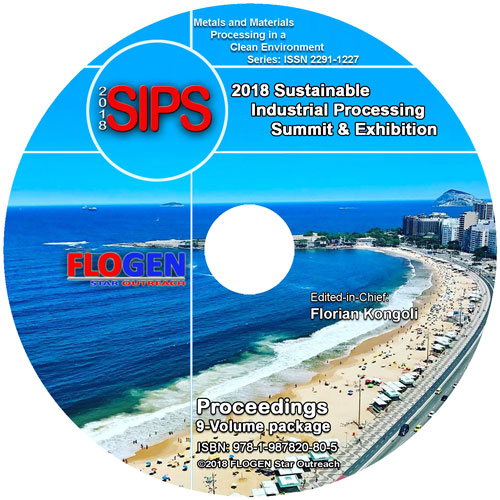2018-Sustainable Industrial Processing Summit
SIPS2018 Volume 5. Zehetbauer Intl. Symp. / SISAM
| Editors: | F. Kongoli, S. Kobe, M. Calin, J.-M. Dubois, T. Turna |
| Publisher: | Flogen Star OUTREACH |
| Publication date: | 23 December 2018 |
| Pages: | 154 pages |
| ISBN: | 978-1-987820-90-4 |
| ISSN: | 2291-1227 (Metals and Materials Processing in a Clean Environment Series) |

CD shopping page
The Controlled Mechanical Property of Collagen Hydrogel for Bone Tissue Engineering
Chun-Ho Kim1; Gilson Khang2; Kwang Seok Kim1; Sang Jun Park1; Wheemoon Cho1;1KIRAMS, Seoul, South Korea; 2CHONBUK NATIONAL UNIVERSITY, Jeonju-si, South Korea;
Type of Paper: Regular
Id Paper: 413
Topic: 42
Abstract:
Collagen hydrogels have been expansively used to mimic the extracellular matrix for three dimensional (3-D) tissue engineering applications because of their excellent biocompatibility and biodegradability. But the poor mechanical properties of collagen hydrogel causes substantial shrinkage during 3-D cell culture [1,2]. In this study, we fabricated a collagen hydrogel reinforced with lyophilized polysaccharide nanofibers (Col/NFs) to reduce the shrinkage of collagen hydrogels. The viscoelastic properties of Col/NFs were measured by using a rheometer. Viability and proliferation of human mesenchymal stromal cells (hMSCs) cultured in the hydrogel, were evaluated using Live and Dead assay, and MTT assay, respectively. Shrinkage rates of Col/NFs hydrogel after hMSCs culture were measured for 15 days. The viscose and elastic modulus of Col/NFs hydrogels were increased with increase of NFs concentration. The proliferation of hMSCs in of Col/NFs hydrogel was slower than that of collagen hydrogel. The viability of hMSCs in both hydrogels was more than 95%. Shrinkage of Col/NFs hydrogel during hMSCs culture were significantly reduced by used NFs. Further, osteogenic differentiation of hMSCs was confirmed using von kossa staining. In conclusion, shrinkage controlled Col/NFs hydrogels can be used bone tissue engineering.
Keywords:
Advanced materials; Biomedical materials; Nanomaterials;References:
[1] J.O. Buitrago, K.D. Patel, A. El-Fiqi, J.H. Lee, B. Kunda, H.H. Lee, H.W. Kim, Acta Biomaterialia. 69 (2018), 218-233.[2] S. Poveda-Reyes, V. Moulisova, E. Sanmartin-Marsia, L. Quintanilla-Sierra, M. Salmeron-Sanchez, G.G. Ferrer, Macromolecular Bioscience. 16 (2016), 1311-1324.